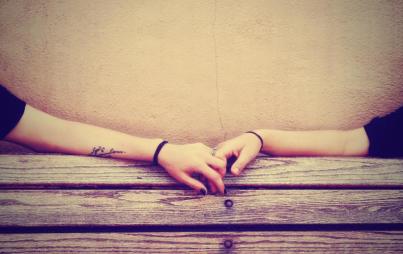
The upside of some serious lows... (Image Credit: Unsplash)
I’m not one to say that everything happens for a reason. Things happen, regardless of fair or unfair. Any meaning we glean from the happenings of our lives, good and bad, is not for us to discover, but to create.
A marriage proposal can portend the end of possibility or the beginning of so many new ones. A death in the family could be a relief to the living, a loved one’s movement to a higher plane, or a chance to realize how much you actually cared.
A diagnosis of mental illness is one woman’s meaningless mental infliction and another’s — what? What meaning is there to make from mental illness?
Not the lessons learned as a result of living with mental illness. Not the chance to lift your voice in advocacy, close to home or spread wide. Not the experience of learning the intricacies and fractures of the American healthcare system. Merely the experience of mental illness itself, and mine in particular.
Is there an upside to bipolar disorder, generalized anxiety, panic disorder, ADHD, and complex PTSD?
I didn’t sit down to write this piece with any answers in mind. I have never thought of my mental illnesses as anything more than a conglomeration of symptoms to work around, medicate, talk through, and minimize. I have never tried to see them as gifts. This is my attempt.
Bipolar disorder is the easiest beginning, if only for the mania. I have often been grateful for the unnatural energy, especially on days like today, when I’ve just caught a cold and both my body and eyes are foggy. Sometimes the energy even comes with intense focus, a microscopic lens I can’t not look through. There’s a confidence to my confinement within a project, a knowing that I’m making a thing and it is good.
Creativity comes from the thoughts that run past me, blurring into one another like time-lapse photography, but I’m quick enough in these moments to grab the tidbits worth having. I sit at my working chair and type until so many things are completed and it doesn’t matter that all the time has gone away. The flurry of lines through tasks on my to-do list means more.
In the spirit of this exercise, I'll admit that my depression doesn't keep me from sleeping enough. If anything, it ensures that I always get enough rest, even more than enough. I'll thank depression for that one, small boon.
I fall into the loveliness of excess lust, embracing the intensified feeling of any touch, the smells that have become more enticing. I let myself get wrapped up in the feelings of elation and euphoria, even if there’s no reason for them, even if they come with risk — the dark side of mania, the fact that any decision I make in that sometimes delicious state could be detrimental, even dangerous.
Of course, bipolar disorder puts mania hand-in-hand with depression. In that respect, I can’t say much about thankfulness. The pull toward lethargy and away from the people and things I love, toward hateful thoughts about myself and away from feeling the need to nourish my body, toward dwelling on my own death and away from feeling any engagement with or enjoyment of life — I can’t help but hate it.
In the spirit of this exercise, I’ll admit that my depression doesn’t keep me from sleeping enough. If anything, it ensures that I always get enough rest, even more than enough. I’ll thank depression for that one, small boon.
It interests me that I can immediately think of the gifts of anxiety, panic, and even my spurts of agoraphobia. Being tense in body and mind, living with fear that feels real even though I know intellectually it isn’t, experiencing the migraines, chest pains and choking sensations — these aren’t things that lend themselves to my happiness.
Yet the compulsion to stay at home, brought on by edginess and unease outside, keeps me productive. I’m obsessively mindful of deadlines, and even if I have trouble meeting them for one reason or another, the fearful focus turns toward communication with my editors and clients. Anxiety makes me communicative, even if just through electronic means. The worry about judgment pushes me to write better, to edit more thoroughly, to answer the voice in my head saying “You’re not good enough” with a defiant “Then watch me improve.”
I may tremble over the idea of making the wrong decision, may follow every possible choice down the road to a potential negative conclusion, but at least it keeps my manic impulsivity in check. I’m more cautious and more thoughtful, even if those thoughts aren’t always positive.
In the same way, ADHD precipitates leaps of thought that keep my work fresh. Having trouble staying on topic isn’t always a terrible thing; it keeps me from burnout. The impatience it brings pushes me to do more now —pursue a career as an author, send pitches to places of prestige, ask for advancements in my career— because in my mind, time is ticking.
Even as I arrive at C-PTSD, the diagnosis that eviscerates me most, the shoddy wiring in my brain that pushes me into the worst places I’ve ever inhabited, it doesn’t bother me that I can’t think of what good it’s given.
Yes, it’s pushed me into anger, toward others and myself. It’s nearly smothered me in sadness, guilt, shame, and a complete inability to act. I’ve felt completely severed from my body, tangled in intrusive thoughts, and utterly unable to trust anyone (while at the same time praying avidly for a savior). It’s taken my faith in love and placed it in a bottle instead; I’ve spent too many nights relying on wine, beer, or gin to erase the pain and remembrance of it. I’ve harmed myself because of it. I’ve tried to die.







